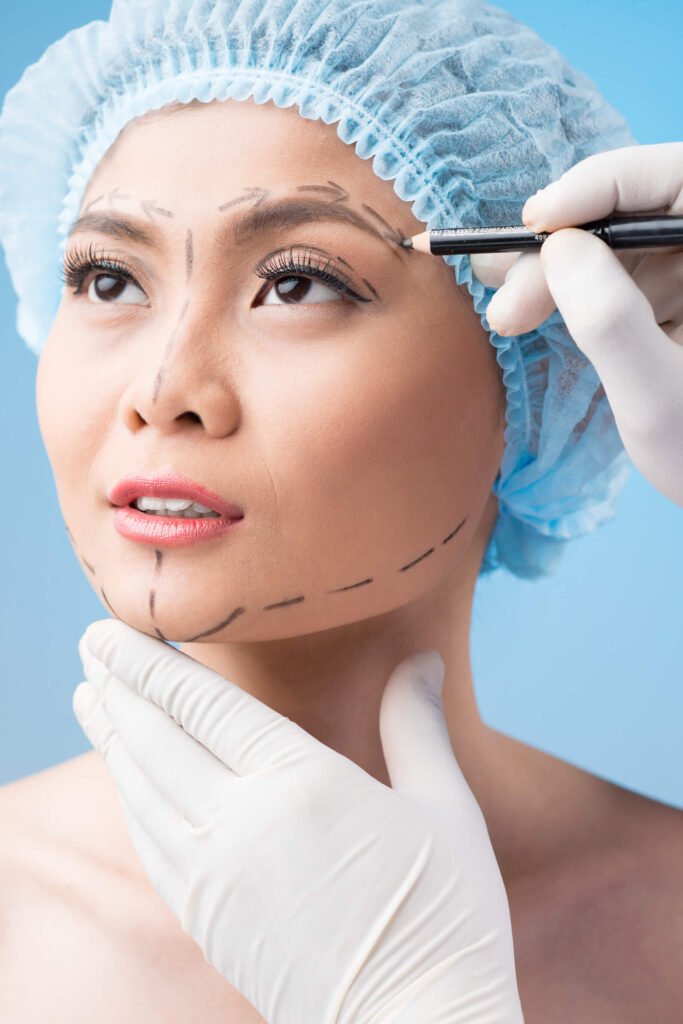Chin implant surgery, or chin augmentation, is a popular cosmetic procedure that enhances facial balance and strengthens the jawline. Like any surgical intervention, it’s natural to wonder:
Is chin implant surgery safe?
The short answer is: Yes — when performed by a qualified, board-certified facial plastic surgeon, chin implant surgery is considered safe and effective. However, as with any medical procedure, it carries some potential risks and complications.
In this article, we’ll explore the safety profile of chin implants, common risks, and proactive steps patients can take to ensure a safe and successful outcome.
🛡️ How Safe Is Chin Implant Surgery?
Chin implant surgery has a high satisfaction rate and is generally low risk, especially when performed by an experienced surgeon in an accredited surgical facility.
Key safety highlights:
- Minimally invasive (small incision, short surgery time)
- Outpatient procedure (no hospital stay required)
- Uses biocompatible implants (usually silicone or porous polyethylene)
- Quick recovery and long-lasting results
When performed under sterile conditions and with proper surgical technique, the vast majority of patients experience smooth, complication-free recoveries.
⚠️ What Are the Risks of Chin Implant Surgery?
While uncommon, the following risks are associated with chin implant surgery:
1. Infection
- Most likely to occur in the first 7–10 days
- More common with intraoral incisions (inside the mouth) due to oral bacteria
Signs: Redness, fever, swelling, drainage from the incision site
2. Implant Shifting or Misalignment
- Occurs if the implant moves out of position post-surgery
- May require revision surgery
Causes: Trauma, inadequate healing, or poor implant placement
3. Nerve Injury or Numbness
- Temporary numbness in the chin or lower lip is common and usually resolves in weeks
- Rarely, numbness may be long-term if a nerve is irritated or injured
4. Scarring
- Minimal with submental (under-chin) incisions
- Intraoral incisions leave no visible scars
5. Unsatisfactory Aesthetic Results
- Implant may appear too large or too small
- Facial asymmetry may persist
- Revision surgery may be needed to adjust size or position
6. Seroma or Hematoma
- Fluid or blood accumulation under the skin
- May require drainage
✅ How to Minimize Risks: Patient Checklist
1. Choose a Board-Certified Facial Plastic Surgeon
This is the single most important factor. Board certification ensures your surgeon has the proper training, experience, and credentials. Look for a surgeon certified by:
- The American Board of Facial Plastic and Reconstructive Surgery (ABFPRS)
- The American Board of Otolaryngology – Head and Neck Surgery
2. Have a Thorough Pre-Surgical Evaluation
- Share your full medical history
- Discuss any allergies, medications, or prior surgeries
- Get clearance from your primary care physician if needed
3. Follow Pre-Op Instructions Closely
- Avoid blood-thinning medications (aspirin, ibuprofen, supplements)
- Stop smoking at least 2–4 weeks before and after surgery
- Maintain good oral hygiene if having an intraoral incision
4. Practice Excellent Post-Operative Care
- Keep your head elevated to reduce swelling
- Take all prescribed medications, including antibiotics
- Avoid touching or bumping your chin in the first few weeks
- Stick to a soft-food diet if advised
- Attend all follow-up appointments for monitoring
5. Communicate Immediately if You Notice Anything Unusual
Call your surgeon if you notice:
- Worsening pain or swelling
- Signs of infection
- Sudden changes in sensation
- Implant movement
Early intervention can prevent minor issues from becoming serious.
🧬 Are Chin Implants Safe Long-Term?
Yes — modern chin implants are made from biocompatible materials that are designed to last a lifetime. They do not degrade over time and rarely need to be replaced unless there’s trauma, infection, or a desired aesthetic revision.
Patients typically enjoy permanent results with little maintenance.
💡 Chin Implant Safety: Myths vs. Facts
| Myth | Fact |
|---|---|
| Chin implants are dangerous or unnatural | They are safe, well-tolerated, and can look very natural in the right hands |
| All implants eventually need to be replaced | Most chin implants last a lifetime unless complications arise |
| The risk of infection is high | Infections are rare and preventable with proper care |
| Recovery is extremely painful | Most patients report mild soreness, not severe pain |
Final Thoughts
Chin implant surgery is a safe, low-risk procedure that can offer dramatic improvements in facial harmony and confidence. With careful planning, proper technique, and patient compliance, complications are rare — and results are often life-changing.




